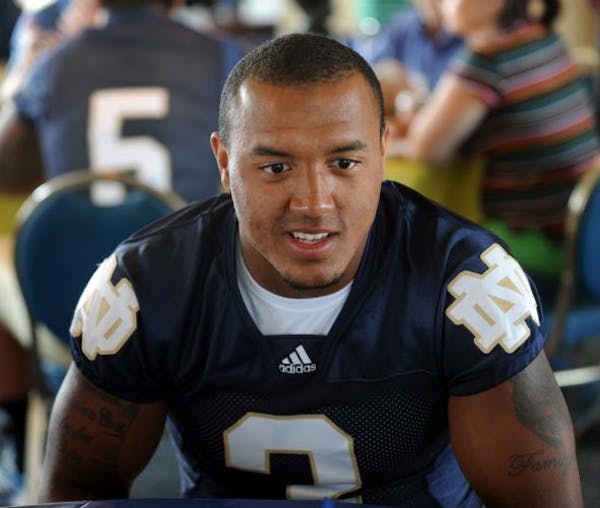A rugged, hard-boiled, football-immersed coach like Murray Warmath probably would laugh, Rev. Lee Doucette said Monday, at the notion that "he was a good shepherd to his flock. But he was."
And no proof could illustrate the point more than the dozens of former players who, after singing the "Minnesota Rouser" upon the conclusion of Warmath's memorial service, milled in front of St. Stephen's Episcopal Church in Edina, trading stories and testifying to the terror -- and the affection -- that the longtime Gophers football coach, who died Wednesday at 98, inspired.
"We were all terrified of him," said Alvin Ray Hawes, an offensive tackle who played for Warmath's Gophers from 1968 to '70. "But after a while, you appreciate what he's done for you. He never played favorites, and he set a high standard that he expected you to meet. It made us better people, not just football players."
Added Ezell Jones, an All-Big Ten defensive tackle on the 1967 Big Ten champions: "He was my mom and dad. He got more out of guys because they knew how much he cared. And the core of his teams, 40 guys or so, we've all stayed together, like family, because of him."
Several hundred mourners -- including Gov. Mark Dayton, who declared Monday "Murray Warmath Day" in Minnesota -- listened as Doucette recounted how Warmath stayed true to his principles, which included becoming one of the first college coaches to recruit and play blacks, even as Gophers boosters grew impatient following 1-8 and 2-7 seasons in 1958 and '59. Disgruntled fans threw garbage on his lawn, and Twin Cities businessmen raised money to buy out his contract.
"He knew he had a strong coaching staff, and players with great potential, and he stood up to his critics," Doucette said, and even made Sandy Stephens his starting quarterback. The result: back-to-back Rose Bowl trips, led by the Stephens, the first black All-America QB, for the Gophers, who haven't been back to Pasadena since.
Along with former Gophers All-Americas such as Carl Eller and Bob Stein, the mourners included former Gophers coach Glen Mason and current coach Jerry Kill, who said he never had a chance to meet Warmath but had read his biography, "The Autumn Warrior."
"We need to go back to his way," Kill said of Warmath, who was 87-78-7 in his 18 seasons at Minnesota, including a pair of Big Ten championships. "His way worked."
His way was disciplined yet humane, his players said, traits he learned growing up in Humboldt, Tenn., where his mother died when he was 10. Hawes recalled sobbing in a corner of the Gophers locker room in Madison, Wis., after his final game as a Gopher, a 39-14 loss to Wisconsin in 1970.
"I felt someone touch my head, and it was him. He talked to me like he never talked to me before," Hawes said. "He thanked me for the four years I played for him. He said he expected great things from me. And he invited me to come on his TV show the next morning. He had a way of reaching you."
Age robbed Warmath of his energy in his final years, but he still attended nearly every Gophers home game, and visited the home locker room in TCF Bank Stadium that is named for him.
Warmath was attended to for more than two decades by Peter Franzen, a friend of Warmath's late son William. (Warmath's wife of 63 years, Mary Louise, died in 2002, and a daughter, Carol Warmath Dillow, died last April. His surviving son, Murray Warmath Jr., spoke at the funeral.) "There are a lot of great men here today, but the real All-American is Peter," Jones said.
"I got 10 times more out of [the relationship with the coach] than I put into it," Franzen said. "I had no clue when I met him that he was a coach. He was just a great man."

KAT was in foul trouble, but Timberwolves didn't flinch
Olympian Kristi Yamaguchi is 'tickled pink' to inspire a Barbie doll

Wolves smother Suns 105-93 to go up 2-0 in playoff series

